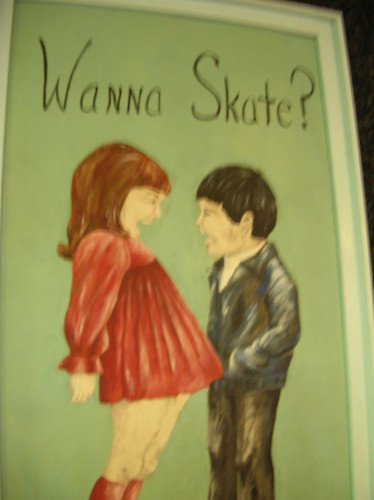සමහර වෙලාවට අපට
ඉංග්රීසි නවකතා, සිංදු ආදියේ, කතාබහේදි විතරක් පාවිච්චි වෙන යෙදුම් හම්බ වෙනවා. එවැනි ඇතැම් යෙදුම් උසස්
ගණයේ ව්යවහාරය හැටියට නොසැලකෙන ඒවා වෙන්නත් පුලුවන්. නමුත් ස්වාභාවික ලෙස කතාවක්
ඉදිරිපත් කරද්දි යම් පුද්ගලයෙක් කියූ දෙයක් එලෙසින්ම ඉදිරිපත් කිරීමට සිදු වෙන
නිසා - විශේෂයෙන් නවකතා ආදියේ - ඒවා දකින්නට ලැබෙනවා.
මේ ආකාරයේ යෙදුම් අපි අපේ භාවිතයට නොගැනීම වඩා හොඳ වුණත්, ඒවා තේරුම් ගැනීමට හැකි වීම අවශ්යයි. එවැනි කීපයක් අපි බලමු.
මේ ආකාරයේ යෙදුම් අපි අපේ භාවිතයට නොගැනීම වඩා හොඳ වුණත්, ඒවා තේරුම් ගැනීමට හැකි වීම අවශ්යයි. එවැනි කීපයක් අපි බලමු.
1. gotta
අපි කලින් ලිපියක
(WeHave to Learn English - කළ යුතු දේ ගැන) කතා කළා ‘have
to’ සහ ‘have got to’ යෙදුම් පාවිච්චි
වෙන ආකාර ගැන. ‘have got to’ යන්න අවිධිමක් (informal) ව්යවහාරයේ ‘got
to’ ලෙස කෙටියෙනුත් කියවෙනවා. මේ ‘got to’ කොටස ඇතැම් අය උච්චාරණය
කරන අවිධිමත් ආකාරය (/ˈgɒtə/) නිසා එය ‘gotta’ ලෙසත් දකින්න ලැබෙනවා.
I’ve
got to go now. / I’ve gotta go. [අවිධිමත් (කෙනෙක් කී දෙයක් උපුටා ලිවීමේදී පමණයි)] / I got to go now. [අවිධිමත්] / I gotta go now. [අවිධිමත් (කෙනෙක් කී දෙයක් උපුටා ලිවීමේදී පමණයි)]
මම දැන් යන්න ඕනැ
(යා යුතුයි).
You’ve
got to be wrong. / You’ve gotta be wrong. [අවිධිමත් (කෙනෙක් කී දෙයක් උපුටා ලිවීමේදී පමණයි)] / You got to be wrong. [අවිධිමත්] / You gotta be wrong. [අවිධිමත් (කෙනෙක් කී දෙයක් උපුටා ලිවීමේදී පමණයි)]
ඔයාට වැරදිලා
වෙන්න ඕනැ (වැරදිලා වෙන්න ඇති).
*** ‘gotta’ යන්න ‘got a’ දෙපදය ඇතැම් අය අවිධිමත් ලෙස උච්චාරණය කරන ආකාරය දක්වන්නත් යෙදෙනවා.
Have
you got a pen? / You got a pen? [අවිධිමත්] / You gotta pen? [අවිධිමත් (කෙනෙක් කී දෙයක් උපුටා ලිවීමේදී පමණයි)]
ඔයා ළඟ පෑනක්
තියනවද?
2. gonna
සිදු වීමට යන
දෙයක් සඳහා ‘going to’ යෙදෙන ආකාරය “Will or Shall? - අනාගතයේදී” ලිපියේ සාකච්ඡා කෙරුනා. ‘going
to’ යන්න ඇතැම් අය අවිධිමත්
ලෙස උසුරුවන ආකාරය (/ˈgɒnə/) දැක්වීමට ‘gonna’ යන්න යෙදෙනවා.
He’s
going to call home. / He’s gonna call home. [අවිධිමත් (කෙනෙක් කී දෙයක් උපුටා ලිවීමේදී පමණයි)]
එයා ගෙදරට කතා
කරන්න යන්නේ.
3. wanna
‘want
to’ හා ‘want a’ දෙපදවලදී ඇතැම් අයගේ
අවිධිමත් උච්චාරණය (/ˈwɒnə/) දැක්වීමට මෙය යෙදෙනවා.
I
want to go. / I wanna go. [අවිධිමත් (කෙනෙක් කී දෙයක් උපුටා ලිවීමේදී පමණයි)]
මට යන්න ඕනැ.
Do
you want a drink? / You want a drink? [අවිධිමත්] / You wanna drink? [අවිධිමත් (කෙනෙක් කී දෙයක් උපුටා ලිවීමේදී පමණයි)]
ඔයාට බොන්න
මුකුත් ඕනැද?
***මේ ආශ්රයෙන් (‘want to be’ යන්නෙන්) සෑදී ඇති ‘wannabe’ (/ˈwɒnəˌbiː/) පදය ‘යම් උසස් තත්වයකට ආසා කරන, එවැනි තත්වයක් තමන්ට ඇති
ලෙස හැසිරෙන කෙනෙක්’ හැඳින්වීමට යෙදෙනවා.
She’s
a wannabe singer. එයා ගායිකාවක් වෙන්න දඟලන කෙනෙක්.
4. helluva
යමක් අවධාරණය
කිරීමට අවිධිමක් භාවිතයේ යෙදෙන ‘hell of a’ යන්නේ උච්චාරණය (/ˈhɛləvə/) ඇතැම් විට මෙසේ
දැක්වෙනවා.
It
took a hell of a long time. [අවිධිමත්] / It took a helluva long time. [අවිධිමත් (කෙනෙක් කී දෙයක් උපුටා ලිවීමේදී පමණයි)]
ඒකට මාර වෙලාවක්
ගියා.
5. gimme, lemme…
ඇතැම් අය ‘give me’, ‘let me’ වැනි කොටස් උසුරුවන ආකාර (/ˈɡɪmiː/, /ˈlɛmiː/)
දැක්වීම සඳහා ‘gimme’, ‘lemme’
වැනි රටා යෙදෙනවා.
Give me the book. / Gimme the book. [අවිධිමත් (කෙනෙක් කී දෙයක් උපුටා ලිවීමේදී පමණයි)]
මට පොත දෙන්න.
Let me ask a question. / Lemme ask a question. [අවිධිමත් (කෙනෙක් කී දෙයක් උපුටා ලිවීමේදී පමණයි)]
මට ප්රශ්නයක් අහන්න ඉඩ දෙන්න.
6. gotcha
‘I got
you’ යන්න සඳහා කතාබහේදී කෙටියෙන් යෙදෙන ‘got
you’ යන්නෙහි ඇතැම් අයගේ උච්චාරණය දැක්වීමට ‘gotcha’ (/ˈgɒtʃə/) යන්න යොදා ගැනෙනවා.
Got you. [අවිධිමත්] / Gotcha. [අවිධිමත් (කෙනෙක් කී දෙයක් උපුටා ලිවීමේදී පමණයි)]
ඔයා මට අහූ උනා. /
මට ඔයා කියන දේ තේරෙනවා.
7. sorta, kinda, outta…
ඇතැම් අයගේ අවිධිමත් උච්චාරණය දැක්වීමට ‘sort of’ සඳහා
‘sorta’ (/ˈsɔːtə/ [බ්රි] - /ˈsɔrtə/ [ඇ]) යන්න, ‘kind of’ සඳහා
‘kinda’ (/ˈkaɪndə/) යන්න, ‘out of’ සඳහා ‘outta’ හෝ ‘outa’ (/ˈaʊtə/) යන්න ආදිය යොදා ගැනෙනවා.
(‘sort of’ හා ‘kind of’ හි අවිධිමත් භාවිත ගැන “IKind of Like Computers - කම්පියුටර් වර්ගයකටද කැමති?” ලිපියේ සඳහන් වෙනවා.)
I kinda / sorta like that guy. [අවිධිමත් (කෙනෙක් කී දෙයක් උපුටා ලිවීමේදී පමණයි)]
මට මිනිහ ගැන
පොඩි (එක්තරා විදිහක) පැහැදීමක් තියනවා.
Get out of here. / Get outta here. [අවිධිමත් (කෙනෙක් කී දෙයක් උපුටා ලිවීමේදී පමණයි)]
මෙතනින් යන්න (පලයන්).
8. cuppa
බ්රිතාන්ය
භාවිතයේ ‘cup of tea’ අදහසින් අවිධිමත් කතාබහේදී ‘cuppa’ (/ˈkʌpə/) යන්න ඇතැම් විට හමු
වෙනවා.
How about a cuppa? [අවිධිමත් - බ්රි]
තේ කෝප්පයක් බොමුද?
9. musta, shoulda…
‘must have’, ‘should have’ ආදිය ඇතැම් අය
අවිධිමත් ලෙස කියන අයුරු දැක්වීමට ‘musta’ (/ˈmʌstə/), ‘shoulda’ (/ˈʃʊdə/)
ආදිය යෙදෙනවා.
(‘must have’ හා ‘should have’ ආදියේ භාවිතය ගැන “You Could Have Done It - ගිය දේගියාවේ කියලම බැහැ” ලිපියේ සඳහන් වෙනවා.)
They
must have forgotten it. / They musta forgotten it. [අවිධිමත් (කෙනෙක් කී දෙයක් උපුටා ලිවීමේදී පමණයි)]
ඒ අයට එක අමතක
වෙලා ඇති.
You
should have come with us. / You shoulda come with us. [අවිධිමත් (කෙනෙක් කී දෙයක් උපුටා ලිවීමේදී පමණයි)]
ඔයාට අපි එක්ක
එන්නයි තිබුනේ.
10. dunno
ඇතැම් අය ‘don’t know’
යන්න උසුරුවන අයුරු දැක්වීමට ‘dunno’ (/dəˈnəʊ/, /ˈdʌnəʊ/ [බ්රි] - /dəˈnoʊ/, /ˈdʌnoʊ/ [ඇ])
භාවිතා වෙනවා.
I don’t know. / I dunno. [අවිධිමත් (කෙනෙක් කී දෙයක් උපුටා ලිවීමේදී පමණයි)]
මම දන්නෙ නැහැ.
11. heck
කලින් සඳහන් කළ
ආකාරයට අවිධිමත් ඉංග්රීසි භාෂාවේ යමක් අවධාරණයට යොදා ගන්නා ‘hell’
පදය සාමාන්යයෙන් නම් ‘අපාය’ අර්ථය ගන්නා නිසා ඇතැම් අය එය මගහැර ඒ වෙනුවට ‘heck’
පදය යොදා ගන්නවා.
It
took a heck of a long time. ඒකට මාර වෙලාවක් ගියා.
Who
the heck are you? කව්ද හැබෑට ඔහේ?
Why the heck did she go there? එයා අහවල් එකකටද
එහෙ ගියේ?
Oh
heck, the bus has left. මළා, බස් එක ගිහින්.
***ඉහත උදාහරණ සියල්ලේම ‘heck’ වෙනුවට ‘hell’ යෙදුවහොත් වඩාත්
සැර හැඟීමක් දැක්වෙනවා.
*** ‘heck’
පදය සහිත ‘for the heck of it’ යන යෙදුම ‘නිකම් විනෝදෙට’ අර්ථය දෙනවා.
They
just did it for the heck of it. ඒ අය ඒක නිකම් විනෝදෙට කළේ.
12. darn / darned
යමක් ගැන තරහෙන්, පුදුමයෙන්... ආදී හැඟීමකින් කතා කිරීමේදී, අවිධිමත් අවස්ථාවල ඇතැම් අය අවධාරණයට යොදා ගන්නා ‘damn’ හෝ ‘damned’
පද පාවිච්චියට ගැනීමට අකමැති අය (‘damn’
යන්න සාමාන්යයෙන් ‘අපායට නියම කරනවා’ අර්ථය ගන්නවා) එහි සැර බාල කිරීමට ඒ වෙනුවට ‘darn’ හෝ ‘darned’ සමහර තැන්වල යොදා
ගන්නවා (‘darn’ පදයේ සාමාන්ය
අර්ථය ‘(රෙද්දක සිදුරක්
වැන්නක්) නූලින් මසා මූට්ටු කරනවා’ යන්නයි).
Darn
it! I can’t find the keys. මොන බම්බුවක්ද! මට යතුරු හොයා ගන්න බැහැ.
I
don’t know how to use this darn /
darned phone. මම දන්නෙ නැහැ මේ ඉලව් ෆෝන් එන පාවිච්චි කරන විදිහ.
It’s
darn / darned hot today. අද මාර රස්නෙයි.
It’s a darn / darned good idea. ඒක මරේ මරු (එළම එළ) අදහසක්.
We did our darnedest to be there on time. අපි පුලුවන් හැම
කෙහෙල්මලම කෙරුවා වෙලාවට එතන ඉන්න.
13. ain’t
මේ පදය ඇතැම්
අයගේ ඉතා අවිධිමත් කතා බහේදී ‘am not’, ‘isn’t’ හා
‘aren’t’ මෙන්ම ‘hasn’t’ හා ‘haven’t’ යන පද වෙනුවටද යෙදෙනවා.
එසේම සම්මත ව්යවහාරයේ නැත යන අර්ථයෙන් ‘anything’, ‘anybody’ ආදී පද යෙදෙන
තැන්වල ‘ain’t’ සමග යෙදෙන්නේ ‘nothing’, ‘nobody’ ආදී පදයි.
They ain’t here. ඒ අය මෙහෙ නැහැ.
You ain’t seen nothing yet. ඔයා තාම මුකුත් දැක්කෙ
නැහැ.








Very nice article...truly a great effort.....:D
ReplyDelete@Shadow/හේමලයා
ReplyDeleteThanks a lot.
Great work brother.
ReplyDelete@හෙළයා
ReplyDeleteThanks, brother.
ගොඩාක් කාලෙක ඉඳන් දැනගන්න ඕන වෙලා හිටපු දේවල් ටිකක් දැනගත්තා. ස්තූතියි.
ReplyDeletethanks a lot!great!need more! =)
ReplyDelete@thariya
ReplyDeleteප්රයෝජනවත් වුණ බව දැන ගන්න ලැබුන එක සතුටක්.
@Anonymous
ReplyDeleteMy pleasure. More is on the way.
1) What does it mean by " I will be damned?"
ReplyDelete2) Are these words ( gonna , wanna , etc ) slang ? Is it ok to use them in formal speech ?
1) What does it mean by " I will be damned" ?
ReplyDelete2)Are these words slang? Is it ok to use them in formal speech?
I got an email notification from Blogger saying that an anonymous reader had attempted twice to make the following comment (which, for some reason, has failed to appear here):
ReplyDelete'1) What does it mean by " I will be damned" ?
2)Are these words slang? Is it ok to use them in formal speech? '
So here are the answers:
1) "I'll be damned!" is a swearing expression used by some people to show that they are surprised or shocked. On the other hand, in expressions like "I'm damned if I know it / if I talk to her...", the speaker swears that he or she doesn't know it / won't talk to her... But remember that they are all very informal and other people might find this type of swearing offensive too.
2) I'd say that these words are all informal and they should never be used in formal speech. (Slang rather means informal expressions that are mostly used by a certain category of people. For example, you find "teenage slang", "university slang" etc.
Oh, I now see that the comments have finally appeared. And I have already answered them.
ReplyDeletethis ain't no uber
ReplyDeleteyou ain't no cop
those above sentences I saw on a book sir.I was so confused to understand the meaning .then I remember the related lesson which sir has thought. what that both mean sir...can it be used sir ? because ain't means 'is not' and also it repeat again 'no' word after ain't. thank you
This type of double negative is common with 'ain't'. Remember that it's very informal usage. As I pointed out in the lesson, though 'ain't' contains 'not', 'nothing' is used with it where 'anything' should be used in standard usage. In your examples you find a similar double negative where 'no' is used although the preceding 'ain't' does contain 'not' in it.
DeleteI was curious to know.Thank you very much, sir.I really appreciate your work.Before reading this blog, I hated English, but this blog has made me love English.. thank you again for your great work.
DeleteGlad to hear that.
DeleteSir I have one more problem sir. actually I've seen those above short patterns with movie subtitles and on books.so sir,can we use it while texting.thanks sir
ReplyDeleteThese aren't short forms meant for texting. The reason why you see these mainly in movie subtitles and dialogues in novels is that their main function is to describe the way certain people pronounce the phrases involved. Apart from that, you can use these forms for a purpose like comical effect where appropriate.
Delete